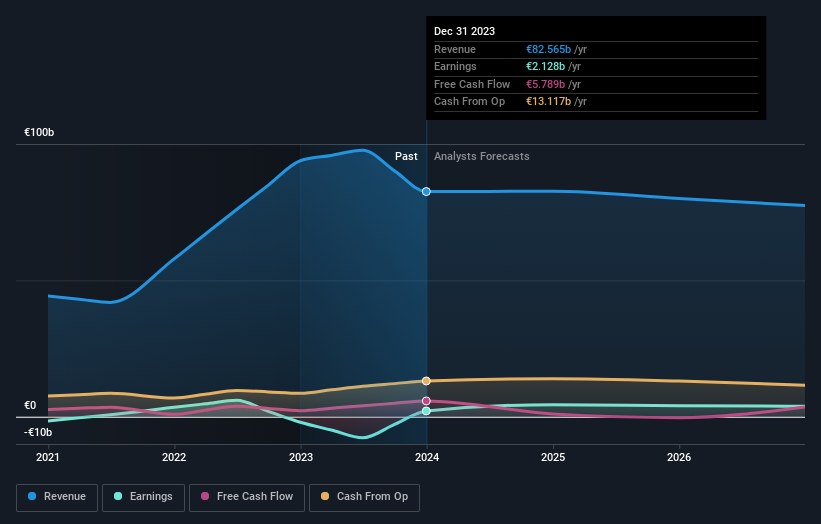
Engie SA (EPA:ENGI) received a lot of attention from a substantial price movement on the ENXTPA over the last few months, increasing to €16.27 at one point, and dropping to the lows of €14.32. Some share price movements can give investors a better opportunity to enter into the stock, and potentially buy at a lower price. A question to answer is whether Engie's current trading price of €15.46 reflective of the actual value of the large-cap? Or is it currently undervalued, providing us with the opportunity to buy? Let’s take a look at Engie’s outlook and value based on the most recent financial data to see if there are any catalysts for a price change.
See our latest analysis for Engie
What's The Opportunity In Engie?
Good news, investors! Engie is still a bargain right now. According to our valuation, the intrinsic value for the stock is €23.84, but it is currently trading at €15.46 on the share market, meaning that there is still an opportunity to buy now. Engie’s share price also seems relatively stable compared to the rest of the market, as indicated by its low beta. If you believe the share price should eventually reach its true value, a low beta could suggest it is unlikely to rapidly do so anytime soon, and once it’s there, it may be hard to fall back down into an attractive buying range.
What does the future of Engie look like?

Investors looking for growth in their portfolio may want to consider the prospects of a company before buying its shares. Although value investors would argue that it’s the intrinsic value relative to the price that matter the most, a more compelling investment thesis would be high growth potential at a cheap price. With profit expected to grow by 81% over the next couple of years, the future seems bright for Engie. It looks like higher cash flow is on the cards for the stock, which should feed into a higher share valuation.
What This Means For You
Are you a shareholder? Since ENGI is currently undervalued, it may be a great time to accumulate more of your holdings in the stock. With an optimistic outlook on the horizon, it seems like this growth has not yet been fully factored into the share price. However, there are also other factors such as capital structure to consider, which could explain the current undervaluation.
Are you a potential investor? If you’ve been keeping an eye on ENGI for a while, now might be the time to enter the stock. Its prosperous future outlook isn’t fully reflected in the current share price yet, which means it’s not too late to buy ENGI. But before you make any investment decisions, consider other factors such as the strength of its balance sheet, in order to make a well-informed investment decision.
If you want to dive deeper into Engie, you'd also look into what risks it is currently facing. At Simply Wall St, we found 3 warning signs for Engie and we think they deserve your attention.
If you are no longer interested in Engie, you can use our free platform to see our list of over 50 other stocks with a high growth potential.
If you're looking to trade Engie, open an account with the lowest-cost platform trusted by professionals, Interactive Brokers.
With clients in over 200 countries and territories, and access to 160 markets, IBKR lets you trade stocks, options, futures, forex, bonds and funds from a single integrated account.
Enjoy no hidden fees, no account minimums, and FX conversion rates as low as 0.03%, far better than what most brokers offer.
Sponsored ContentValuation is complex, but we're here to simplify it.
Discover if Engie might be undervalued or overvalued with our detailed analysis, featuring fair value estimates, potential risks, dividends, insider trades, and its financial condition.
Access Free AnalysisHave feedback on this article? Concerned about the content? Get in touch with us directly. Alternatively, email editorial-team (at) simplywallst.com.
This article by Simply Wall St is general in nature. We provide commentary based on historical data and analyst forecasts only using an unbiased methodology and our articles are not intended to be financial advice. It does not constitute a recommendation to buy or sell any stock, and does not take account of your objectives, or your financial situation. We aim to bring you long-term focused analysis driven by fundamental data. Note that our analysis may not factor in the latest price-sensitive company announcements or qualitative material. Simply Wall St has no position in any stocks mentioned.
About ENXTPA:ENGI
Engie
Operates as an energy company, engages in the renewables and decentralized, low-carbon energy networks, and energy services businesses in France, Europe, North America, Asia, the Middle East, Oceania, South America, Africa, and internationally.
Undervalued with solid track record and pays a dividend.
Similar Companies
Market Insights
Community Narratives



